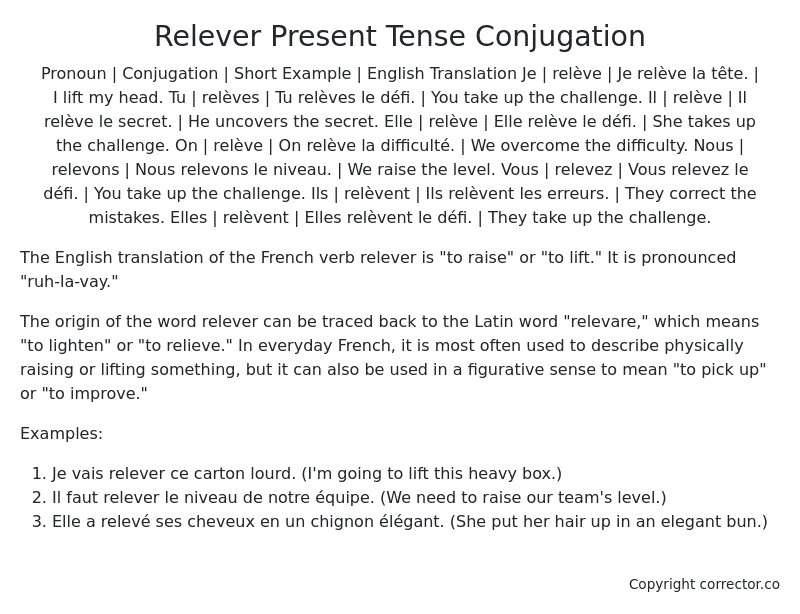Le Present (Present Tense) Conjugation of the French Verb relever
Introduction to the verb relever
The English translation of the French verb relever is “to raise” or “to lift.” It is pronounced “ruh-la-vay.”
The origin of the word relever can be traced back to the Latin word “relevare,” which means “to lighten” or “to relieve.” In everyday French, it is most often used to describe physically raising or lifting something, but it can also be used in a figurative sense to mean “to pick up” or “to improve.”
Examples:
- Je vais relever ce carton lourd. (I’m going to lift this heavy box.)
- Il faut relever le niveau de notre équipe. (We need to raise our team’s level.)
- Elle a relevé ses cheveux en un chignon élégant. (She put her hair up in an elegant bun.)
Relever – About the French Present Tense
To take a deep dive into all the French tenses then see our article on Mastering French Tense Conjugation.
Common Everyday Usage Patterns For Le Present
Interactions with Other Tenses
Table of the Present Tense Conjugation of relever
Pronoun | Conjugation | Short Example | English Translation
Je | relève | Je relève la tête. | I lift my head.
Tu | relèves | Tu relèves le défi. | You take up the challenge.
Il | relève | Il relève le secret. | He uncovers the secret.
Elle | relève | Elle relève le défi. | She takes up the challenge.
On | relève | On relève la difficulté. | We overcome the difficulty.
Nous | relevons | Nous relevons le niveau. | We raise the level.
Vous | relevez | Vous relevez le défi. | You take up the challenge.
Ils | relèvent | Ils relèvent les erreurs. | They correct the mistakes.
Elles | relèvent | Elles relèvent le défi. | They take up the challenge.
Other Conjugations for Relever.
Le Present (Present Tense) Conjugation of the French Verb relever (this article)
Imparfait (Imperfect) Tense Conjugation of the French Verb relever
Passé Simple (Simple Past) Tense Conjugation of the French Verb relever
Passé Composé (Present Perfect) Tense Conjugation of the French Verb relever
Futur Simple (Simple Future) Tense Conjugation of the French Verb relever
Futur Proche (Near Future) Tense Conjugation of the French Verb relever
Plus-que-parfait (Pluperfect) Tense Conjugation of the French Verb relever
Passé Antérieur (Past Anterior) Tense Conjugation of the French Verb relever
Futur Antérieur (Future Anterior) Tense Conjugation of the French Verb relever
Subjonctif Présent (Subjunctive Present) Tense Conjugation of the French Verb relever
Subjonctif Passé (Subjunctive Past) Tense Conjugation of the French Verb relever
Subjonctif Imparfait (Subjunctive Imperfect) Tense Conjugation of the French Verb relever
Subjonctif Plus-que-parfait (Subjunctive Pluperfect) Tense Conjugation of the French Verb relever
Conditionnel Présent (Conditional Present) Tense Conjugation of the French Verb relever
Conditionnel Passé (Conditional Past) Tense Conjugation of the French Verb relever
L’impératif Présent (Imperative Present) Tense Conjugation of the French Verb relever
L’infinitif Présent (Infinitive Present) Tense Conjugation of the French Verb relever
Struggling with French verbs or the language in general? Why not use our free French Grammar Checker – no registration required!
Get a FREE Download Study Sheet of this Conjugation 🔥
Simply right click the image below, click “save image” and get your free reference for the relever Present Tense tense conjugation!

I hope you enjoyed this article on the verb relever. Still in a learning mood? Check out another TOTALLY random French verb present conjugation!



